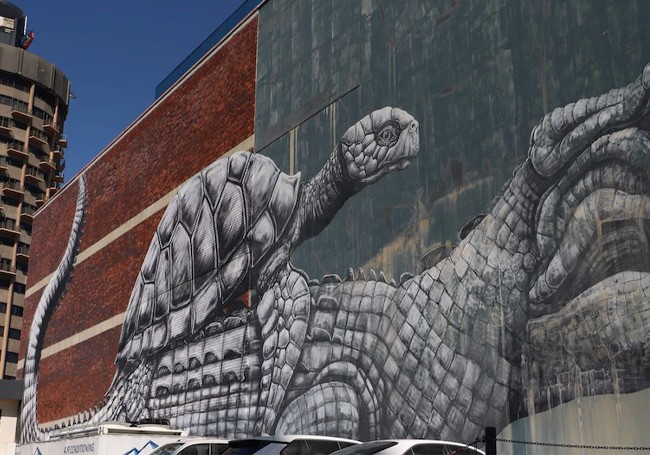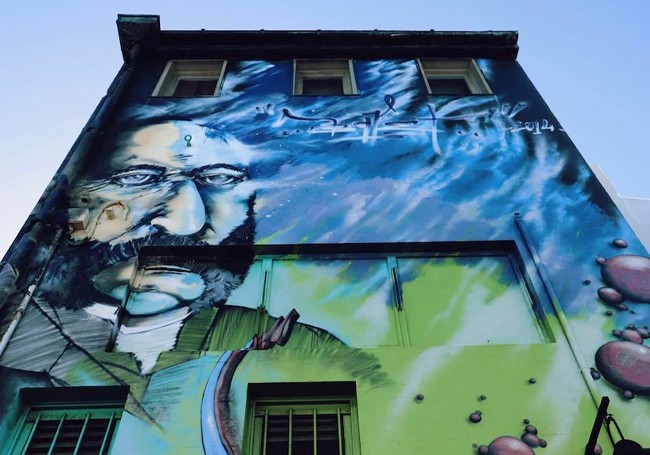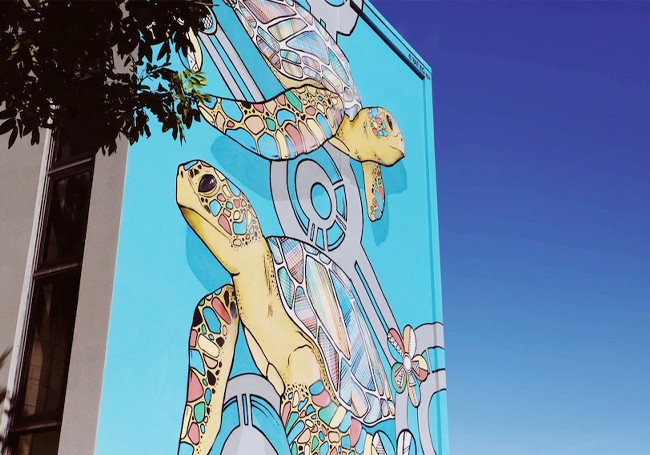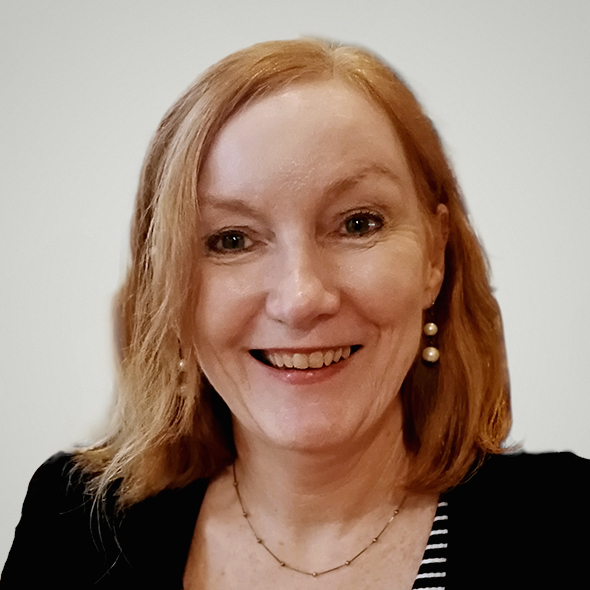Townsville, the capital of North Queensland, may be known for its laidback tropical lifestyle, strong Cowboys footy team and some of the best scientific marine work in the world, but what is little known is that it’s also been quietly developing First Nations reconciliation work that is making a difference to community and country.
Pictured Sam Savage, Australian Red Cross. Mural artist (above:) Adnate
With 9 per cent of Townsville citizens identifying as Indigenous, (about 4 per cent higher than the Australian average), organisations such as the Australian Red Cross and Townsville City Council are getting positive results with employment and procurement programs that are run by First Nations leaders.
The council operates an Indigenous Supplier Panel of around 70 businesses owned and operated by First Nations people. The council spent nearly $2.5 million with local Indigenous businesses in the 2021 financial year.
It has also set a target to employ 8 per cent Indigenous staff by 2024 (15 per cent for entry level positions) and to procure 5 per cent of its goods and services from First Nations businesses by 2025. The council, which holds an Indigenous Business Fair, last year adopted its third RAP plan (Stretch RAP – Sept 2021 to June 2024).
“We like to showcase what good looks like and encourage people to come along with us and show them examples,” says Stacey Coburn GAICD, Director of Business Services at the council. The council’s targets are the highest for any local or state government agency in Australia, she adds.
“We've seen great success, even with some of the big organisations in the region,” says Coburn. They've met with us and are either leveraging our panel or we have encouraged them to set up their own.”
Townsville City Council is one of the largest employers locally and has helped the Defence Force, James Cook University, Townsville University Hospital and Townsville Port in this space. “We have worked with chief procurement officers from all those organisations to educate them about our Indigenous Supplier Panel and have encouraged them to use it,” says Coburn.
The council was also one of the first local government agencies in Queensland to establish a dedicated Aboriginal and Torres Strait Islander panel for consultation under its first RAP, set up in 2012.
Indigenous procurement work at the council has been led by Chief Procurement Officer and First Nations man Rob Passmore.
“A lot of Indigenous businesses, especially here in Townsville, are small to medium enterprises,” says Passmore. “We have been able to facilitate their growth and improve governance. We also saw through the pandemic that there was a significant opportunity there in terms of PPE for face masks and hand sanitiser.”
One local company, Absolute Building Supplies, pivoted during the pandemic to manufacture PPE and pandemic products in Townsville. “Because that business was on our panel, they had the opportunity to supply a number of other councils, not just in North Queensland but in NSW, the Northern Territory and other state government agencies as well,” says Passmore.

Australian Red Cross First Nations engagement
Another organisation which is carrying out significant First Nations engagement work on the ground in Townsville and nationally is the Australian Red Cross.
Townsville-based Sam Savage, chairperson of the Australian Red Cross National First Nations Recovery Group, is a traditional owner of the Bindal Clan group in Townsville and has ancestry that is both Aboriginal (Birrigubba Nation) and Torres Strait Islander (Mauar Island). He has worked for the Australian Red Cross since 2014 and says being part of an organisation where reconciliation is acted upon at the highest levels is important, not only for staff but for the large Indigenous community it serves.
“It benefits the end users. A lot of our clientele are Aboriginal and Torres Strait Islanders…So it's around creating a voice and walking alongside First Nations people and communities. I believe it’s about accountability to our mob as well.”
The Australian Red Cross makes sure internally that it gets the right people in different positions, “whether that’s at a leadership level or an operational level. And it's about creating a culturally safe space for both team members and our consumers”.
Savage says the Australian Red Cross First Nations Recovery Group is a collective of several First Nations recovery officers across the country who engage and support Aboriginal and Torres Strait Islander peoples and communities impacted by disasters. This group also provides advice to Red Cross organisation and external partners in the disaster management space with a cultural lens view.
“Recovery isn't a sprint, it's a marathon and people recover in different ways,” says Savage. For First Nations communities displaced by disaster, it can mean a loss of connection to country, livelihood and cultural practice that can impact future generations. “This is what we want the Red Cross to consider when we start to implement recovery and resilience programmes or training for service providers and community.”
The Australian Red Cross raised $53.9 million in donations from individuals, businesses and governments to help victims of the devastating floods that hit eastern Australia in the first three months of 2022. Around 66,800 grants were made to people in flood-hit communities. A further $8.6 million has been allocated to a three-year recovery program, which began in mid-May 2022.
Advocacy and influence is an important part of his job as chair and Savage says he deals with government and philanthropic agencies on inclusion, voice and investment in First Nations disaster and resilience and recovery programs, projects, speaks at conferences and takes part in webinars and podcasts external to the Australian Red Cross. “It’s important to create that conversation piece. It's really getting that messaging right. We need to change that mindset, and we need to change the attitudes and behaviours and practices in how we support marginalised groups. And the conversations need to be true and meaningful.”

Australian Red Cross RAP
The Australian Red Cross has started work on its fourth RAP, to be published in early 2023. It started work on its first RAP more than 10 years ago.
In its third RAP, (Stretch RAP 2018-2021) Australian Red Cross president Ross Pinney, who was born on the land of the Wurundjeri People of the Kulin Nation, says the organisation is working towards a reconciled Australia by acting as a truth teller and change agent by challenging negative stereotypes, busting untrue narratives and fostering understanding.
“As we build an organisation that is culturally safe for Aboriginal and Torres Strait Islander staff, volunteers, clients and visitors, we receive the gift of a First Nations perspective.” It can’t be replicated through a set of written rules, he says, but instead, through commitment, practice, ongoing learning, trust and relationship building, two ways of working can come together.
The charity’s reconciliation movement is guided by the National Aboriginal and Torres Strait Islander Leadership team, the RAP Implementation Group and RAP champions.
In developing its third RAP, the Australian Red Cross adopted a co-design approach where staff, volunteers, members and its First Nations leadership teams generated more than 100 ideas, many of which were incorporated in the plan.
The charity set a target for procurement to procure goods and services from at least 200 Aboriginal and Torres Strait Islander owned businesses, accounting for at least 3 per cent of procurement spend yearly. Another target was to seek to have 2.8 per cent of its active volunteers and members identify as Aboriginal and Torres Strait Islander peoples. It also sought to develop five new commercial partnerships with Aboriginal and/or Torres Strait Islander businesses.
The charity has elevated the role and voice of First Nations peoples at all levels, from the national board to state and territory advisory boards, and in organisational leadership positions. It has also strengthened its procurement policy to invest in First Nations businesses and suppliers, sourcing through Supply Nation, which operates a database of more than 3,800 verified Indigenous businesses.
The charity is mobilising its corporate network to develop their own RAPs, and links them with other corporates which are further along in their reconciliation journeys. It encourages schools with which it currently works to develop a RAP using the Reconciliation Australia Narrangunnawali online platform and is developing a two-way mentoring initiative and cultural exchange between First Nations staff and the Australian Red Cross national leadership team.

Hope for the future
Savage is also chair of the Townsville Hospital and Health Services Aboriginal and Torres Strait Islander Community Advisory Council, which is a collective of local community leaders acting as a link for First Nations health consumers and creating a ‘Voice’ for First Nations people to increase health equity within the health system. “I've got a great passion for helping our people and, if I can assist with ‘positive change’ for my First Nations people and communities, I will strive to do my best in achieving that,” he says.
The new role arose from his former role as chair of the Townsville First Nations COVID vaccination rollout programme. Through a campaign of increased media coverage to promote vaccination, Townsville rose from the second-lowest vaccine rated population in Queensland for First Nations people to within the top three of 15 health districts in Queensland.
Savage welcomes the federal government’s proposals for a referendum on the national Voice to Parliament. “I think for us as First Nations people, it’s a time for hope where the change of government will show the need to walk alongside Aboriginal and Torres Strait Islander peoples for Voice, Treaty and Truth and assist in the creation of self-empowerment and self-determination. “We want everyone to walk together, rather than walk in front or behind. It's all about us working together and acknowledging the past, but being ‘true’ on how we move forward.”
And while reconciliation has a long way to go, Savage has a positive outlook. “If we can all have an open mind, I've got a lot of optimism for our world in the future.”

Latest news
Already a member?
Login to view this content


